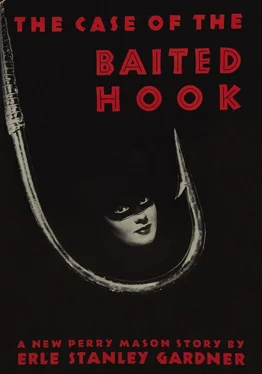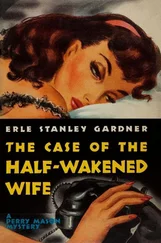“Go on,” she said.
Mason told her briefly of the mysterious caller and what had taken place at the interview.
“How did he get your unlisted telephone number, Chief?”
“That is simply another indication of the care with which he’d prepared his campaign.”
“It wasn’t something on the spur of the moment?”
“I think the thing that caused him to call on me was something that happened rather unexpectedly, and apparently he’d decided some time ago that if he ever needed a lawyer he’d call on me, and he blueprinted his plans for reaching me and filed them away in the back of his mind. It’s indicative of the man’s character.”
“But how about that elevator business?” Della Street asked.
“That,” Mason said, “was a case where luck played into his hands. He owns a controlling stock interest in this building. He probably has duplicate keys to everything. Just as a matter of precaution, I didn’t leave that fragment of the ten-thousand-dollar bill in the office overnight. I figured a man who had a key to the elevator would very probably have a passkey to my office.”
“How about the woman? Do you think he’d planned to consult you in connection with her?”
“No. I think that was something that developed rather unexpectedly,” Mason said musingly. “Take that mask for instance. I’m virtually certain it had been part of a costume at a masquerade ball. It was a black mask with tinsel trimming. Evidently, it had been made to go with a masquerade costume — one of the things a woman would file away in a drawer of keepsakes.”
“Couldn’t you tell anything about her, Chief?”
“I’d say she was not over thirty,” Mason said, “and that she had a good figure. Her hands were small, but she was wearing gloves much too large. There were a couple of rings on the right hand, and one on the left. You could see the outlines through the gloves. She’d turned them so that the stones were on the inside.”
“Wedding ring?” she asked.
“I don’t think there was a wedding ring. And she was afraid to let me hear her voice.”
“Then you must know her,” Della Street said. “That is, you must have already met her, and she was afraid her voice would give her away.”
“Either that, or I’m going to meet her in the near future. Somehow I’m more inclined to the future theory than the past.”
“Why?”
“I don’t know, just a hunch.”
“How do we handle it on the books?”
Mason handed her the portion of the ten-thousand-dollar bill. “That’s up to you — but that piece of ten grand you’ve got there is powerful bait.”
Della sniffed. “You know perfectly well you’re more intrigued by the Mysterious Madame X than you are by the money. Why not ‘The Case of the Masked Mistress’?”
“Well, that’s a thought,” he said, “although you may wrong the girl’s morals.”
“Did she look like a moral young woman?”
Mason grinned. “As to that,” he said, “it’s hard to tell even when you see them in complete regalia, watch the gestures of their hands, and listen to their voices. This woman kept her hands on the arm of the chair, her feet on the floor, and her mouth shut. Open up a file on ‘The Case of the Baited Hook’ and you’ll be right whoever or whatever she is.”
“And the answer’s supposed to be in the newspaper?”
“Not the answer,” he said, “but a clue.”
“Do you want me to look through it?”
“You take the first section,” he said. “I’ll take the second. Let’s not overlook anything: notices of death, or intentions to wed, birth notices, and divorces — particularly divorces.”
And Mason promptly turned to the sporting page.
Fifteen minutes later, Della Street looked up from the section of the newspaper she had been studying. “Find anything?” she asked.
“Nuh uh.”
She said, “I thought perhaps you’d find that One-punch Peltham had been signed up with Joe Louis for a fifteen-round bout.”
He grinned. “No harm killing two birds with one stone, Della.”
“We’ve thrown all our rocks, and haven’t even got a feather. I can’t find a thing. Did he act as though he expected it would be something obscure?”
“No, he didn’t,” Mason said. “I gathered that it would be spread on page one of the newspaper — something one couldn’t miss.”
“Well, it hasn’t broken then, that’s all.”
“That,” Mason said, “complicates matters. I don’t have any idea what it was he really wanted me to do. I might take a divorce case against Mrs. Jones and have Mrs. Jones walk in and shove the other half of this ten-thousand-dollar bill across the desk, and say, ‘Is this any way to treat a client?’ ”
“Or,” Della Street said demurely, “you might fire me for inefficiency and suddenly have me push the rest of that ten-thousand-dollar bill in front of you, and say, ‘Is this any way to run a law office?’ ”
Mason looked at her with sudden suspicion. “By George,” he said, “—now you have given me something to think about.”
She laughed.
Gertie, the big, good-natured blonde, who presided over the information desk and switchboard in Mason’s outer office, tapped on the door, then opened it, and slipped into the room. “Can you,” she asked, “see A. E. Tump?”
“What does he want?” Mason asked.
She shook her head. “It isn’t a he. It’s a she.”
“What’s the name?”
“Just A. E. Tump, but she’s a woman.”
“What does she want?”
“She wants to see you, and she looks like a woman who has a habit of getting what she wants.”
“Young?” Mason asked.
“Nope. She’s around sixty-five, and she still has sex appeal, if you know what I mean.”
Mason said, “Good Lord, Gertie. You don’t mean she’s kittenish.”
“No, not kittenish, and she isn’t one of those women who tries to have the figure of a young woman of twenty. But… well, she has personality and uses it. She puts her stuff across.”
Mason said to Della Street, “Go find out what she wants, Della. Give her the once-over.”
Mason returned to the newspaper, turning idly through the pages, reading the headlines, and waiting.
Della Street returned in a few moments and said to Perry Mason, “She’s white-haired, smooth-skinned, broad of beam, matronly in a seductive way. She seems to have money and poise and she has character and personality. Maybe you ought to see her.”
“What does she want?”
“It’s over a trust fund and an illegal adoption proceedings.”
Mason said, “Bring her in,” and Della returned to escort the new client into the office.
“Good morning, Mrs. Tump,” Mason said.
She smiled at him and walked across to seat herself in the big leather chair.
Mason, sizing her up, said laughingly, “You were announced as A. E. Tump. I thought you were a man.”
The woman beamed across at him. “Well, I’m not,” she said. “A is for Abigail, and E is for Esther. I hate both names. They reek with respectability and Biblical associations.”
“Why didn’t you change your name?” Mason asked, watching her with the shrewd, lawyer-wise eyes.
“Too much trouble in connection with property. My holdings are in the name of Abigail E. Tump. Well, I gave my daughter a break anyway.”
Mason raised his eyebrows.
Mrs. Tump needed no prompting. She went on smoothly in the effortless voice of one who is an easy, fluent talker. “I christened her Cleopatra Circe Tump. I guess it embarrassed her to death, but at least she wasn’t chained to a life of mediocrity by having names that were a millstone of conventional respectability around her neck.”
Читать дальше












